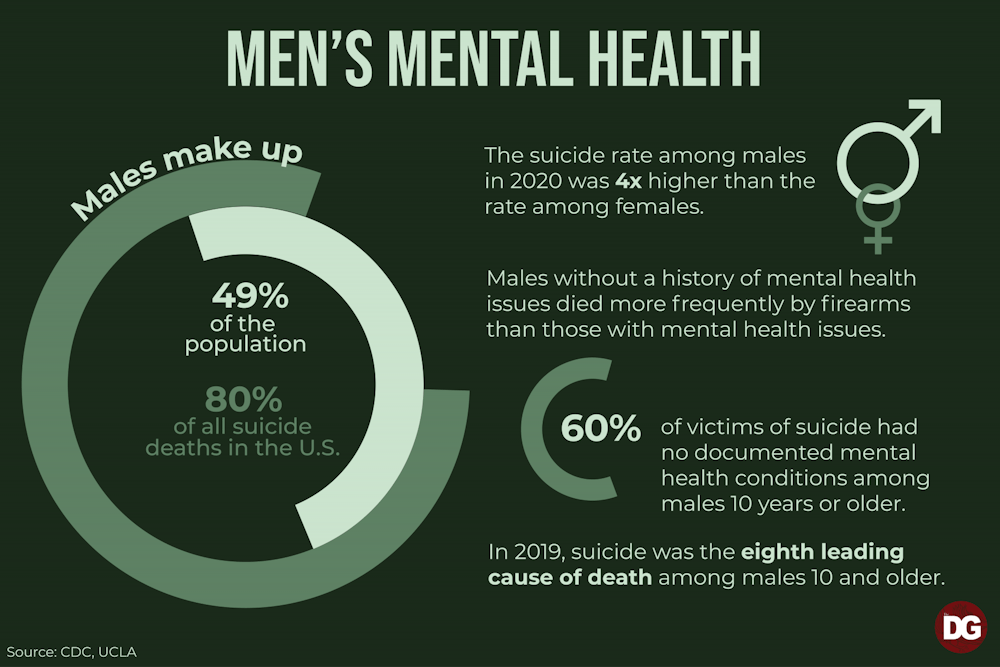Students should bring awareness to the stigma that surrounds men's mental health by discussing it more openly and de-stigmatizing taking advantage of mental health resources during men's mental health awareness month in November and beyond.
It is often more for men than women to discuss mental health issues due to a stigma surrounding the act of speaking up and asking for help. Men make up 49% of the population, yet approximately 80% of deaths by suicide, as reported by the .
Men's difficulties with speaking up can be rooted back to a nature or nurture question, according to doctoral psychology candidate Wendy Chu.
"Whether it's spoken down upon through parents or peers or society, there's messages that we tell men from very young, early ages that talking about emotions is unacceptable," Chu said. "That seeking a therapist should be frowned upon, that you need to deal with it yourself."
Men are more likely to attempt to solve problems on their own or not at all because of prevalent stereotypes encouraging men to not speak up, Chu said. Such tactics sometimes result in suicidal ideation and even death by suicide.
De-stigmatizing and changing what mental health services look like can be another initiative to change the men's mental health narrative. Doing things that make you feel good provides the same feedback as mental health services such as therapy and should be considered as a mental health service.
Aidan Graham is a 2022 Â鶹Сòòò½´«Ã½ graduate, former Phi Kappa Tau brother and best friend to James Royal, a brother who died by suicide last year.
Mental health struggles with men in college can present themselves in different ways. Graham described the life-altering event he was faced with upon one of his best friends dying by suicide last year.
"It was just so sudden and someone I would've never expected. So that experience for sure left a mark on me," Graham said. "You're gonna have times where you're not okay."
Phi Kappa Tau's President, James Royal, died by suicide on Aug. 29, 2021. This caused an increase in awareness and initiatives to better mental health in the Interfraternity Council community.
Such mental health initiatives seen in the Greek community include having mental health committees and chairmen. The brothers in these committees take part in a mental health summit to discuss the benefits Greek life has on mental health as well as how Greek organizations can improve their mental health awareness outreach. This allows the chapter to focus on mental health issues that arise and actively think of ways to combat them.
In addition to mental health chairs, weekly check-ins and fundraisers for mental health have become more frequent, Josh Hambro, a third-year finance student, Phi Kappa Tau member and mental health chairman, said.
Hambro said he developed depression and anxiety during his freshman year and struggled with his mental health because of it.
"It was a rough introduction to college," Hambro said. "I lost about 20 to 30 pounds ... But joining Greek life was an outlet for me to see more friends more often."

Tragedy can result in a more cognizant effort to check in on those around them. Men in particular have been found to express their struggles through stereotypically masculine behaviors. This can include anger issues, impulse control and or alcohol abuse, as found by mental health platform, Talkspace.
Ridding society of the stereotype that surrounds men, and their need to be strong at all times, is the trajectory needed to be taken. Creating a safe space for the men in our lives can initiate good habits and a more willingness to be open about the struggles they face.
Initiating daily check-ins through fraternity GroupMe's or amongst friends is important, but also having a support system means so much more. Learning to lean on one another as brothers or men in the Carolina community can truly change one's outlook whether one knows it or not.

